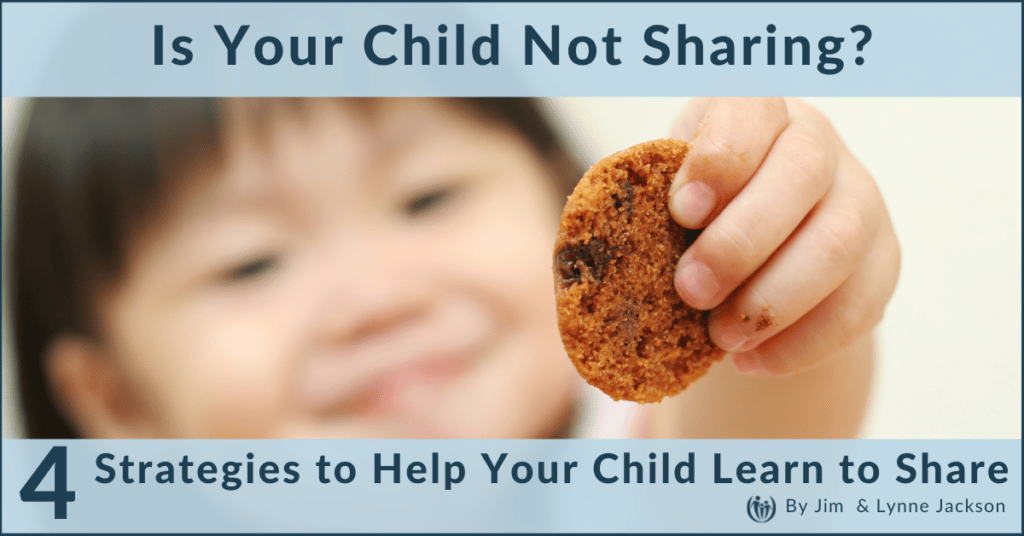
Is Your Child Not Sharing? 4 Strategies to Help Your Child Learn to Share

Your child might sing “sharing is caring” at the top of her lungs one minute and grab her brother’s toy the next. If your small child is not sharing well yet, take a deep breath. Not sharing toys does not mean that your child is doomed to a life dominated by selfishness and greed. Take a deep breath. Relax a bit if you can. You can set aside your anxiety and trust God to help you nurture a value of authentic sharing in your home.
Remember that we all struggle with selfishness, and this is an opportunity for you to set an example of grace. Then consider that there’s some good news in the struggle. When children exhibit some strength of will in their protectiveness about their things, it is not all bad. The good news is your child is exhibiting the healthy ability to set firm boundaries… even if they’ve not yet learned to respect others’ boundaries. With this in mind, let’s dive into how we can help our kids (who are still learning to share) share more authentically!
Left to their own devices, toddlers form “rules of possession” that can last a lifetime if not understood and addressed by parents. Does this list sound familiar?
- If I like it, it’s mine.
- If it’s in my hand, it’s mine.
- If I can take it from you, it’s mine.
- If I had it a little while ago, it’s mine.
- If it’s mine, it must never appear to be yours in any way.
Forcing kids to share reflects your power, not their character. Cultivating joy in sharing leads to true generosity. However, this road of nurturing generosity is a slow process of building a lifelong value. So be patient with your kids and yourself!
Equipped with the guiding insights and proactive strategies below, you’ll be able to help your children learn to value and even enjoy sharing!
First, why learning to share is tough!
1) We are all selfish!
Let’s face it, we grown-ups can be just as selfish as our kiddos. We just know how to shine it up better. Even we, as adults, can be guilty of not sharing. Do we readily share our cars, our boats, our mowers, or our prized possessions? When we do it’s often with an unspoken “you break it, you replace it” clause or an “I’ll scratch your back if you remember to scratch mine later” sort of attitude. We might even “keep track” to make sure the score stays even. Honesty about this helps us be more graceful with our struggling kids and inclined to be better examples of sharing.
2) Forced “sharing” grows resentment and selfishness, not generosity.
Our good intentions to teach sharing can cause us to say things like, “You share with your sister or I’m taking that toy away.” “If you don’t let your little brother play too, you can’t have friends over.” The messages underneath this approach are: “It’s no fun to share — you wouldn’t want to do it, so I have to make you share.” This reinforces the belief that sharing is a frustrating obligation.
Even though it may make us feel in control for the moment, forcing kids to share usually grows resentment and selfishness, not generosity. This insight can help you let go of a need to control the outward behavior of not sharing.
Research from Cornell supports this. Each child in one group of kids was given a sticker and asked if they wanted to share it with a sad puppet. “Once children made a difficult decision to give up something for someone else, they were more generous, not less, later on.” Children shared fewer stickers in later opportunities if they were in groups either required to share the sticker or given an obvious (controlling) choice to share it or discard it.
Also, the more valuable the item shared (i.e. a cool toy frog vs. shreds of paper), the more it set kids up to be generous in the future. “…children did not benefit from the mere act of sharing, but rather from willingly sacrificing something of value.”
3) Jesus always focused on the inner heart over outward behavior.
I’m guessing Jesus would have considered “forced sharing” an oxymoron and nothing more than intimidated compliance. If kids never see toys as their own, they can’t share them, they can only play together with something controlled by an adult. Generosity starts when I recognize something of value is truly mine and I want to share it with someone.
4) Sometimes not sharing is healthy.
Boundaries are a difficult concept for small children, but hopefully, as grownups, we’ve learned that sometimes we need to say, “No” to others, and sometimes it’s good when others say, “No” to us. Your child probably asks you to share things all the time that you have to say, “No” to, because it’s unsafe, inappropriate, or not the right timing.
Child’s play is complicated, and your child’s instincts may not always be right. That said, sometimes your child’s reason for not sharing is as valid as the reasons you might say no to an untrustworthy acquaintance asking to borrow your car for a week. If you want your child to be able to give a healthy and strong, “No” later in life, then forced sharing can erode a child’s sense of boundaries and agency. Instead, let’s dig deeper into how you can cultivate a love for sharing and generosity.
In Acts 20:35 Jesus said, ‘It is more blessed to give than to receive.’” If we really believe this, we’ll live it out by sharing generously. To say, “Our family is blessed!” but to keep those blessings to ourselves is the starting place for kids to learn selfishness. If we become models of sharing our blessings with the world around us, our kids will follow suit.
2) Build a value of sharing.
- Talk excitedly about any sharing you’ve done and the charities you support, and why.
- Ask kids sharing-oriented questions:
- How do you feel when people share with you?
- What’s good about playing with someone and sharing your toys?
- What are your favorite toys to share? Why?
- Affirm any sharing you notice among your kids, pointing out the fun that resulted.
- Together with your kids, decide what areas of the house are common spaces and what are private play zones for a special toy or project. They know they are choosing to share or take turns when playing in the common spaces.
- Help your child choose a selection of toys to share before inviting a friend to come over, putting special or breakable toys out of sight.
- When your kids outgrow bikes or toys, involve them in deciding whom to give them to, maybe a younger neighbor or young sibling of a friend.
John, a coaching client, knew sharing was really tough for his anxious son struggling with autism. Here is his story and creative idea for helping his son learn to share:
“My 6-year-old son, Brayden, was really having trouble sharing and playing with other kids, including his sister. So I bought a few really special toys, put them up on the shelf, and told Brayden that these were Sharing Toys. He could get them down when he was ready to play with them with his sister. At first, when he would get them down I played too, to make sure Brayden and Jenna got off to a good start. Then, when Brayden would bring back the toys to be put away, I asked him how it felt to share, and I affirmed his sharing with his sister. Over time, Brayden has really learned to sense when he is in a state of being ready to share, and he will say, ‘Okay, I’m ready to get that toy down now.’He has become much more flexible and happy about sharing in general.“
- Help your child notice the joy on friends’ or siblings’ faces when sharing toys with them, or when giving toys away to younger kids.
- Set your child up to tell others (a parent or a relative) about how sharing made them feel. Maybe even take a picture of them playing with a shared toy and having fun together, and send that to Gramma. 😉
- Teach kids that the joy they feel when they share is because they are made in God’s image, who so generously and joyfully shares good things with us (1 Timothy 6:17-18).
Watch your kids grow into cheerful givers
2 Corinthians 9:7 says, “Each one must give as he has decided in his heart, not reluctantly or under compulsion, for God loves a cheerful giver.” Of course, God loves us when we’re selfish, but He rejoices when our actions flow from a heart of love, not compulsion or self-righteousness. Let’s guide our kids to live out God’s image in them, as they generously and joyfully share with others!
Take 15 minutes to learn how to give consequences that teach, rather than simply punish, by downloading our free ebook Consequences That Actually Work.





